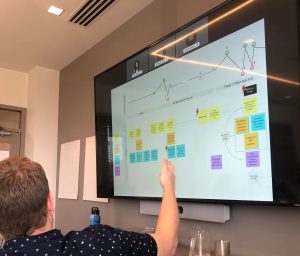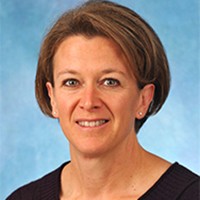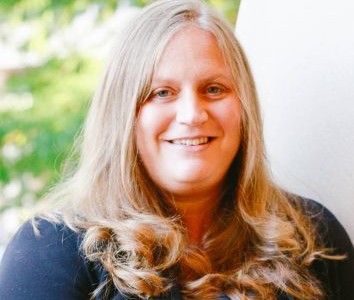January 23, 2023

Written by: Meg Ostrom
The Eshelman Institute for Innovation, within the UNC Eshelman School of Pharmacy, launched the First in Venture Studio (FVS) to partner with the University of North Carolina at Chapel Hill in exploring how digital health innovation can improve health care. With a mission to create new digital solutions through research, ideation and commercialization, the FVS is now poised to launch its first start-up focused on solving addiction care and recovery issues at the heart of the state’s opioid crisis.
Building a broad coalition of Asheville-based health systems, providers, pharmacists, emergency management, criminal justice, non-profits and civic leaders, First in Venture Studio and partners are working to co-create a venture backed start-up with a viable solution to solve a key problem in the opioid crisis. Over a six-month period, the sprint team is going through a structured ideation process to build a pipeline of potential concepts that address opioid issues, identify, fund and launch a new venture and validate the pilot approach as scalable across North Carolina.
Each year, the United States is negatively impacted on multiple levels by opioid use disorder (OUD) – high health care costs, criminal justice costs, loss of business productivity – and most importantly, the human cost of 70,000 lives lost each year. In October, the FVS team, venture partner, High Alpha Innovation and an Asheville coalition of partners including Mountain Area Health Education Center (MAHEC) began the process of mapping the opioid addiction cycle in western North Carolina to clearly understand the full scope of the problem.
“The ideation process really helped educate us on all the elements that impact the opioid crisis in a community and the negative stigma surrounding OUD that impacts how these patients are treated by the community and how it creates barriers to care and treatment,” explains Bob Dieterle, managing director, First in Venture Studio.
After listening to all the issues and ideas brought forth by a diverse team of stakeholders in the ideation sessions, the team came back together again to refine all the input into nineteen opportunity areas and were then scored on three criteria: an urgent, unmet need, the ability to solve the problem and the size of the potential. Based on the final scores of all opportunities, two important themes emerged.
- The first theme focuses on changing the way OUD patients are treated. When a person seeks medical attention for a heart attack or stroke, providers understand the time-sensitivity of the condition and the patient is immediately triaged by clinicians who follow prescribed treatment protocols. When an individual with OUD seeks treatment, the patient’s condition should be treated with the same time-sensitive response from medical providers. Unfortunately, the stigma of OUD, lack of provider education, inconsistent diagnosis and care protocols are all barriers that prevent the same seamless entry into treatment. However, if treatment options are easily accessible and proven medications for opioid use disorder (MOUD) like buprenorphine become more widely available, it is more likely that the OUD patient enters care and starts down the path of recovery. Data from MAHEC shows that 68% of these patients stay in recovery long term once they enter care. The team is now looking at eight areas of start-up opportunities based on the theme.
- The second theme is centered on empowering patients to continue care and pursue recovery. Like the obstacles experienced in entering treatment, OUD patients must also deal with barriers like lack of resources and access to prescriptions once they have established treatment. Due to major gaps in the care continuum, a patient’s treatment journey is one of handoffs between providers and resources. In an October Pew Charitable Trust brief on OUD, a study of at-risk OUD individuals showed only 33% of those patients who initiated treatment made it to recovery. As such, there is a lot of room to intervene and enable continued care. The team identified eleven opportunities for a potential start-up business.
Now, the work of honing the opportunity concepts, market and competition due diligence and economic feasibility begins in earnest. Dieterle and team will have identified the strongest venture concepts by February 7, which begins the High Alpha Innovation Sprint Week. Sprint Week is a three-and-a-half-day, all-hands-on-deck experience during which a team of entrepreneurial experts will team up with the Asheville coalition of partners to transform the most attractive and feasible venture concepts that came out of this structured ideation process into digital health startups that are well positioned for the market. Each concept will produce a professional pitch deck and then present to the First in Venture Studio Investment Committee (FVSIC). The FVSIC will then determine if they want to invest and launch any of the concepts as startups.
As the opioid crisis is impacting the state in so many ways, Dieterle and his colleague, Roy Zwahlen, chief strategy officer at the Eshelman Institute for Innovation, recognized the opportunity to identify other channels for ideas that may not be venture backable concepts. “The Eshelman Institute is about patient impact,” observed Zwahlen. “As not all solutions discovered will be fast-growing startups, our strategy incorporates launching synergistic social enterprises to ensure we have as much impact as possible.” Zwahlen has partnered with Melissa Carrier, director of the Office of Social Innovation at Innovate Carolina, to build and scale community programs, public-private partnerships, non-profits, or social enterprises/B corps built from UNC-Chapel Hill and MAHEC expertise.
“I am excited about this initiative and how it has coalesced disparate entities into a unified team,” said Dieterle. “A remarkable group of public and private organizations came together to educate, brainstorm, collaborate, and reach consensus on the important ideas that could begin to solve the opioid crisis in our state. It’s also gratifying that Roy and his team are moving forward on other ideas that came out of the team’s work. We look forward to the start-up sprint in February and I am optimistic we will be launching our first start-up from this process.”
Latest News

Lisa Tarantino appointed as new Assistant Dean for Research

NIH award leads to deeper study of brain malformations


